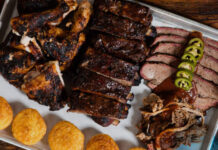The kitchen is the heart of your restaurant! So we’ve compiled a list of essentials you’ll need to check off your list before heading into business with your commercial kitchen!
What’s the True Purpose of a Commercial Kitchen?
Your restaurant kitchen will be the hub where your food is created from start to finish. The storage of food and ingredients, the preparation before cooking, seasoning, cooking, and plating that would make your grandmother cry tears of joy. This should be the focus of your kitchen. As you plan your new kitchen layout and write down the specific appliances you’ll need, make sure to plan realistically. We all would love the latest six-burner stove with a smart convection oven attached, but if you’re dealing with a small space, you may only be able to accommodate a four-burner range stove, and that’s okay! Planning your kitchen strategically will improve the function later on and allow you to optimize your unique kitchen features, space, and workload.
Kitchen Equipment Supply Checklist
- Appetizer plates
- Baking pans
- Baking sheets
- Buckets (labeled for each cleaning product)
- Chef’s knives
- Cleaning rags
- Colander
- Deep-fryer
- Dessert plates
- Drinking glasses
- Entrée plates
- Fire extinguisher
- Freezer
- Funnels
- Grill
- Hand soap & dispensers
- Ladles
- Mixing bowls
- Oven
- Pasta bowls
- Pizza paddle
- Pizza screens
- Plastic inserts for coolers
- Range
- Reach-in cooler
- Rubber floor mats
- Salad plates
- Saucepans
- Sauté pans
- Shelving for a walk-in cooler
- Spatulas
- Steam table
- Stock/soup pots
- Tongs
- Walk-in cooler
- Whisks
Don’t Fall into Too Many Trends
It’s easy to look around and see the newest automated dishwashers and 3D food printers and think that it may be something you’d like to incorporate into your restaurant, but be wary of falling victim to some of the many latest trends. You may think your $300,000 loan is a lot now, but after the massive investment you’re about to make in building your restaurant kitchen, you’ll see how quickly it can run out. Purchasing the newest, high-tech equipment will be convenient during use, but it can quickly rack up your spending budget. Sure, you can always finance or lease your new equipment but watch out for those hefty interest payments you’ll be facing later on.
It’s not top dollar, but when you’re just starting out, consider purchasing used appliances or even participating in a restaurant auction. You can get tons of the necessary from commercial refrigerators to serving utensils and bread baskets. You can find fantastic deals on all of your kitchen equipment if you look in the right places.
Warranties – Read the Fine Print
As you buy all your major appliances, read any warranties you acquire, and don’t feel too badly if you don’t have one! Most warranties only cover damage in specific circumstances, and after reading the fine print, you might find that you’re pretty limited in the help you’re offered by the warranty anyway.
If you take the second-hand route, you will rarely have a valid warranty with your used appliance, but it will be significantly cheaper than buying something new. While you’re collecting all the necessary appliances for your new commercial kitchen, set a decent amount aside for any unexpected commercial appliance repair you may potentially need down the road. Having that extra money planned for needed repairs will negate the loss you may feel from having no warranties to rely on.
Start with the Basics
Strategy is critical when building your kitchen, so before you purchase all the bells and whistles, the first step will be to evaluate the vital parts of your restaurant menu and concept. You wouldn’t serve soft-serve ice cream at a fancy Italian restaurant, so don’t purchase the machinery for soft-serve ice cream, even if it seems like it would be a fun addition. As you collect the basics, don’t go overboard either; keep in mind that you can always add more equipment later on if you find a need for it. It’s better to experiment and identify the true essentials rather than buy lots of expensive items you’ll never use.
You can customize your own personal list using our generic restaurant kitchen checklist. You may not need everything on this list, especially if you specialize in a particular area. For example, if you’re opening a bakery, you may find your needs center more closely around baking pans and pastry equipment, as opposed to an ice cream shop that may have no need for bread baskets but will require several sets of ice cream scooping utensils. Before you finalize your list and make any purchases make sure you have a solid plan that encompasses each aspect of your new restaurant kitchen, including the layout!
Read Also : Top 10 Tips for a Clean Apartment Space



































































